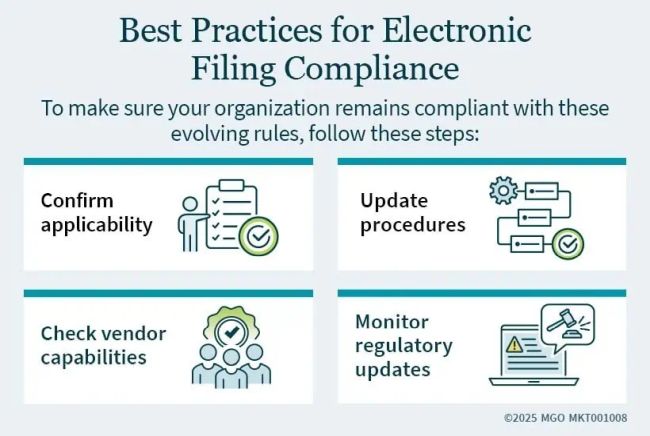- with readers working within the Business & Consumer Services and Insurance industries
- within Real Estate and Construction, Law Practice Management and Law Department Performance topic(s)
- with Finance and Tax Executives
Key Takeaways:
- Plans filing more than 10 returns must file Forms 5558, 5330, and 8868 electronically.
- IRS will disregard paper Forms 5330 if electronic filing is required but not followed.
- Vendors and tax teams must prepare now to meet 2025 mandatory filing rules.
Navigating 2025 Electronic Filing for Benefit Plans
Introduction
Should your organization submit ERISA-related forms electronically or on paper in 2025? For many plan sponsors, the answer isn't optional. As IRS regulations evolve, electronic filing is now mandated for a wide range of benefit plan returns. Understanding what's required — and preparing your internal processes — is critical to avoid late filings, penalties, or even rejected returns. This article helps you evaluate your next steps under the new IRS and DOL compliance landscape.
IRS Mandates for Electronic Filing
On February 23, 2023, the IRS finalized a regulation expanding mandatory e-filing requirements for any filer submitting 10 or more returns. This includes tax forms relevant to employee benefit plans. If your organization meets that threshold, you'll be required to file electronically starting in 2025.
The regulation impacts multiple forms, but three are especially relevant for ERISA plan sponsors:
Form 5558: Extension Requests via EFAST2
Starting January 1, 2025, Form 5558 (used to request an extension for filing Form 5500) can be filed electronically through the DOL's EFAST2 system. While electronic filing is optional for some, it may become mandatory based on return volume.
If your plan's year ends on December 31, the Form 5500 is due by July 31. Form 5558 must be filed before this deadline — meaning your team needs to know now whether electronic filing rules apply.
Form 5330: Late Deposits and Excise Tax
Form 5330 is required when plan sponsors owe excise taxes for late contributions. The IRS has stated that if you meet the 10-return threshold, you must e-file Form 5330 for tax years ending on or after December 31, 2023.
Failing to e-file when required is treated as a failure to file. While the IRS offered a temporary grace period for 2024, it's unclear if this will extend to 2025. Plan sponsors should prepare for mandatory e-filing to avoid compliance gaps.
Form 8868: Extension for Form 5330
Plan sponsors needing more time to file Form 5330 must now use Form 8868 — not Form 5558 — to request an extension. This applies to excise taxes and must be submitted before the filing deadline, along with any payment due.
As with other forms, if you meet the threshold, electronic filing is likely required.
Best Practices for Electronic Filing Compliance
To make sure your organization remains compliant with these evolving rules, follow these steps:
- Confirm applicability: Determine whether your organization meets the 10-return threshold.
- Update procedures: Revise internal tax and benefits workflows to support electronic filings across all relevant forms.
- Check vendor capabilities: Verify that TPAs, recordkeepers, and payroll providers can meet IRS electronic filing requirements.
- Monitor regulatory updates: Review IRS and DOL communications frequently and act on notices without delay.

Why It Matters: Deadlines and Documentation
The most important takeaway: your extension requests must be submitted before the form's due date, whether you file on paper or electronically. Miss the deadline and you may face penalties— even if the transition to electronic filing is still in progress.
This is a significant shift for many organizations, especially those that have traditionally relied on paper forms or are not yet set up for secure electronic filing. Taking proactive steps will ease your compliance burden in 2025.
Support for Confident Compliance
At MGO, we help organizations navigate complex IRS and ERISA compliance requirements. From benefit plan audits to tax filings, our team brings clarity and confidence to each step of the process. Whether you're updating your filing protocols or reviewing Form 5500 extensions, we can support your compliance strategy.
The content of this article is intended to provide a general guide to the subject matter. Specialist advice should be sought about your specific circumstances.


